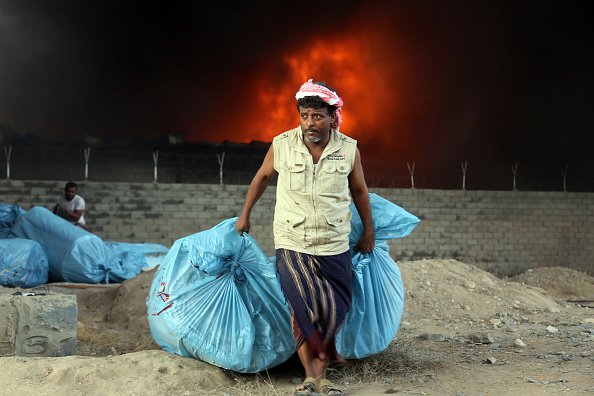Huge numbers of Yemenis flee Hodeidah as fighting nears: Amnesty


By ![]()
Tens of thousands of Yemenis have been fleeing Hodeidah as fighting intensifies on frontlines near the Houthi-held western province, Amnesty International said on Thursday, warning that “the worst is yet to come” if the war reaches urban areas.
Forces backed by a Saudi-led military coalition are advancing toward Hodeidah port city, long a key target in the three-year-old war, though local officials told Reuters this week they do not plan to launch an assault on densely populated areas nearby.
The United Nations puts the number of displaced along Yemen’s western coast in recent months at some 100,000 people, most of them from Hodeidah, the second most populated province, the rights group said.
“The human impact of this fresh military offensive on Yemen’s western coastal areas is clear from the distressing stories shared by civilians displaced by the conflict,” Rawya Rageh, Senior Crisis Response Adviser at Amnesty International, said in a statement.
“It is a glimpse of what potentially lies in store on a wider scale if the fighting encroaches on the densely populated port city of Hodeidah.”
Hodeidah handles the bulk of Yemen’s commercial imports and critically-needed aid supplies. The Western-backed alliance accuses the Houthis of using the port to smuggle Iranian-made weapons, accusations denied by the group and Tehran.
The renewed push toward Hodeidah is taking place amid increased tensions between Saudi Arabia and regional arch-foe Iran, which are locked in a proxy war in Yemen that has killed more than 10,000 people, displaced three million and pushed the impoverished country to the verge of starvation.
Civilians from Zabid, al-Jarahi, Hays and al-Khoukhah, around 100-150 km (90 miles) south of Hodeidah city, told the rights group that they and many others fled to the southern port city of Aden, where the Yemeni government has a presence.
The majority of the displaced said they could only fund the trip by selling their belongings, according to Amnesty.
One woman had a miscarriage upon arriving in Aden after what she described as a terrifying and exhausting journey, the group said, adding that the normally six-hour drive now takes three days due to checkpoints, landmines and other hazards.